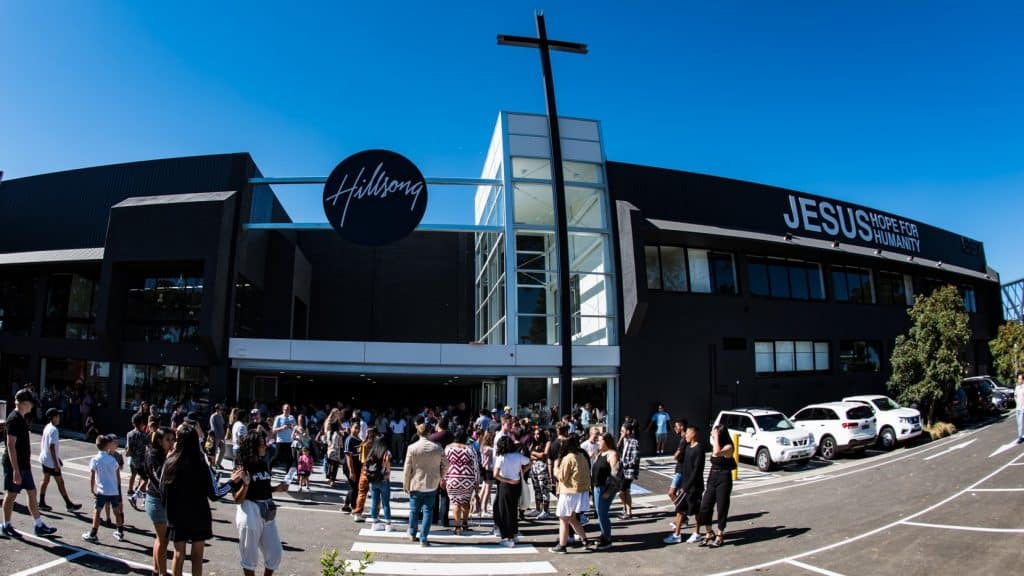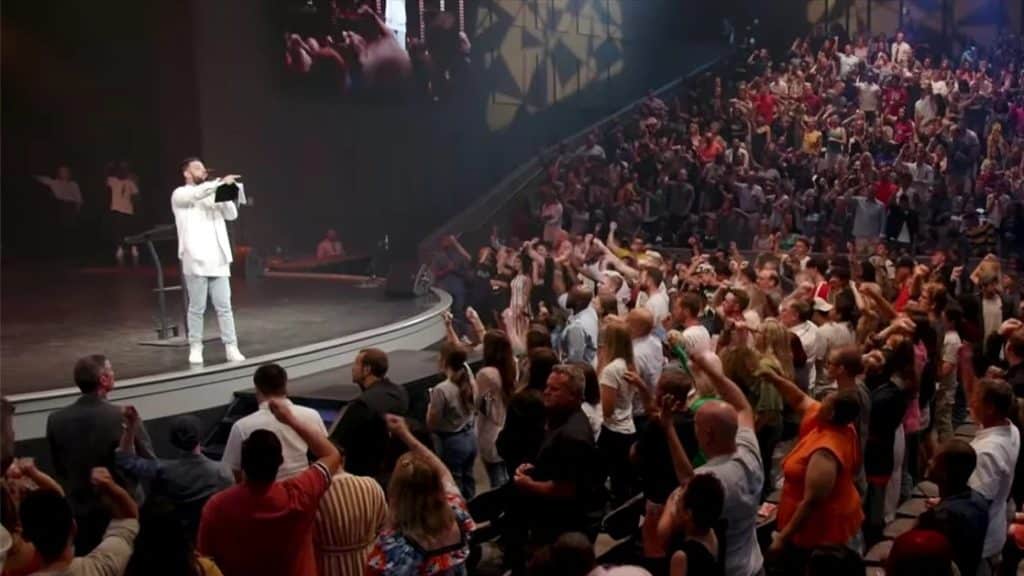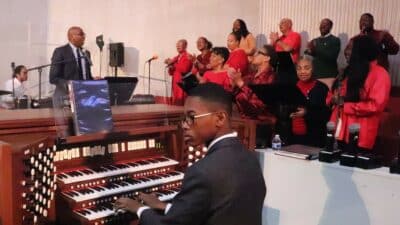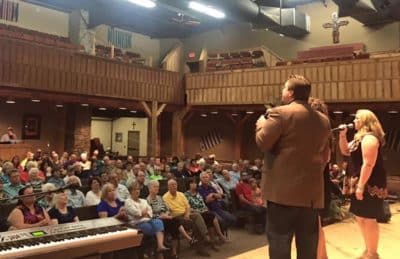Today, almost $600 million is spent annually on audio equipment and instruments for performing church music, according to a 2021 article published by Ultimate Guitar.
Churches have become one of the most common venues for hearing live music.
In six years, Bethel Music, the music ministry of Bill Johnson’s megachurch Bethel Redding, generated $80 million in revenue.
Bethel Music is one of the four most popular church music ministries in America, according to a recent academic study being published at Worship Leader Research.
The researchers identified 38 of the most popular church worship songs from 2010 to 2020. Almost all the songs were written by or performed by Bethel, Elevation Church (pastored by Steven Furtick), Hillsong (founded by Australian pastor Brian Houston), and Passion City Church (pastored by Louie Giglio).
Your tax-deductible gift helps our journalists report the truth and hold Christian leaders and organizations accountable. Give a gift of $30 or more to The Roys Report this month, and you will receive a copy of “Hurt and Healed by the Church” by Ryan George. To donate, click here.

Church performances, concert tours, and radio airplay have boosted worship band awareness. Hillsong has reportedly sold more than 20 million albums.
Business Legal Structure
Most American Christians have never heard of the term integrated auxiliary, but it is the key to understanding how most megachurches and televangelists operate financially successful worship ministries.
The IRS describes integrated auxiliaries as “a class of organizations that are related to a church or convention or association of churches, but are not such organizations themselves.”
For example, Elevation Church registered a trademark for the name Elevation Worship, the name of the worship band. This allows the church to create a bank account and do business in the name of Elevation Worship.
Besides the use of trademarks, megachurches often register tradenames (also called DBAs and fictitious names) to legally conduct business in another name. Vertical Worship is a tradename registered to Harvest Bible Chapel and Lakewood Music is a tradename registered to Joel Osteen’s Lakewood Church. Kenneth Copeland’s Eagle Mountain International Church has registered the trade names Eagle Mountain Recording Studio, KCP Records and KCM Music Group.
Attorney Stephen Lentz (father of Carl Lentz) advises churches to use limited liability companies to protect church assets. Hillsong followed this practice by creating Hillsong Music and Resources, LLC and Hillsong Publishing, LLC. The companies are treated as integrated auxiliaries of the church.

The Passion City Church record label sixstepsrecords, LLC also operates as a non-profit organization but doesn’t file a Form 990.
The profits from music sales and royalties from streaming and radio broadcasts are generally confidential as churches are not required to file a Form 990 information return.
In 2011, two of Senator Charles Grassley’s staffers compiled a memo identifying ways that church and religious non-profit organizations exploited tax loopholes and financial reporting. The report noted, “As a result, we are concerned that the ‘integrated auxiliary’ classification is also being gamed.”
Bethel Music, is unique in that it operates as a separate non-profit organization from the church and discloses its finances in an annual Form 990 filed with the IRS.
The musicians that perform as Bethel Music work as independent contractors for the ministry.
Pastors as Publishers
A year ago, a confidential source attending a church in the northeast contacted Trinity Foundation concerned that a pastor was enriching himself by serving as producer of his church worship band’s albums and receiving a slice of the music royalties.
While the practice is not necessarily illegal, it raises ethical concerns and appears to be growing. Pastors receiving producer credits are frequently musicians themselves.
According to All Music, Steven Furtick has 229 credit listings as a composer and producer, Louie Giglio has 605 credit listings for producing and composing, and T.D. Jakes has 289 credit listings.
Could music royalties be funding Furtick’s lavish lifestyle? Furtick lives in a 10,015 square foot mansion in Waxhaw, North Carolina. Furtick’s church does not disclose Furtick’s compensation.

Need for Reform
Today’s Contemporary Christian Music scene grew out of the Jesus Movement in the 1960s and 1970s. From primitive beginnings, a complex music industry emerged.
Author William D. Romanowski observed the early stages of these trends decades ago. An article in Cornerstone Magazine quotes him at length: “The industry scaffolding began to go up as concert halls replaced coffeehouses and church fellowship halls, as record labels replaced custom recordings, and as contemporary music radio formats replaced tapes of preachers.”
In prescient remarks, Romanowski continued: “Christian entrepreneurs were building a Christian entertainment industry that paralleled its secular counterpart not just in musical styles and trends, but in marketing techniques, management, concert production, publicity, and glamorization.”
As the industry grew, Christian musicians concerned with the commercialization of church music tried different approaches. The band Second Chapter of Acts stopped requiring a financial guarantee for its concerts.
David Lowman, author of the CCM’s 500 Best Albums of All Time blog, reports that singer Keith Green “made the albums available for whatever the person could afford, even if that meant free. Over 25% of the sales of the following albums were sent out at no charge.”
Today’s Christian music industry needs a new generation of musicians willing to rethink the “business” of church music.
The late gospel singer Danny Taylor offered a scathing critique of the Christian music industry which he helped build.
“It boils down to two concepts diametrically opposed to each other,” said Taylor, as quoted in a 1993 book about the evangelical media industry. “One is the concept of Christ, a blood-bought salvation, living in eternal relationship with a loving, caring God. That concept is in opposition to another called merchandising.”
2 Peter 2:3 in the King James Version warns that a time will come when religious leaders will “make merchandise of you.” Church leaders will turn the church into a marketplace for their greed.
This opinion article, which was originally published by Trinity Foundation, does not neccesarily reflect the views of The Roys Report.
Barry Bowen is a staff member of Trinity Foundation, a public nonprofit based in Dallas, Texas that has been tracking religious fraud and helping victims for over 30 years.




















3 Responses
Thanks for the informative article, Barry! There is lots of money to be made in churchianity.
It’s ironic that this industry originated with hippies. Often, I find myself wishing I could lose myself in worship like many of those around me, without caring how the sausage is made. Then I start thinking maybe I’m getting stadium rock fatigue at church. Then I start wondering how the Holy Spirt was able to move before amplifiers were invented. I think I’m getting too old.
I first started visited to the US in the late 80s, and even then the church services I attended felt more like concerts than services when it came to the music. Being from the UK, as part of the congregation I was used to singing five or six full hymns (with piano or organ accompaniment) during the service, sometimes led by a small unamplified choir (depending on the church), and occasionally led in a song or chorus by the youth group.
So coming to the US and finding myself just watching the vast majority of the music being sung by a massive choir and soloists accompanied by a full band of pro or semi-pro musicians, was a disappointingly non-participatory experience. The music was excellently produced, but the experience felt empty somehow.
And even when there was communal singing, it was led by the worship leader whose amplified voice dominated the singing of the congregation as we were hurriedly conducted through bunch of choruses in double quick time, as though it we shouldn’t be wasting too much time on it.
I’ve long since left the faith, but of what I’ve seen on Christian TV over the years, my experience wasn’t that out of line with the typical mid-to-large congregational Sunday morning service experience. It just seemed it was all about the show.